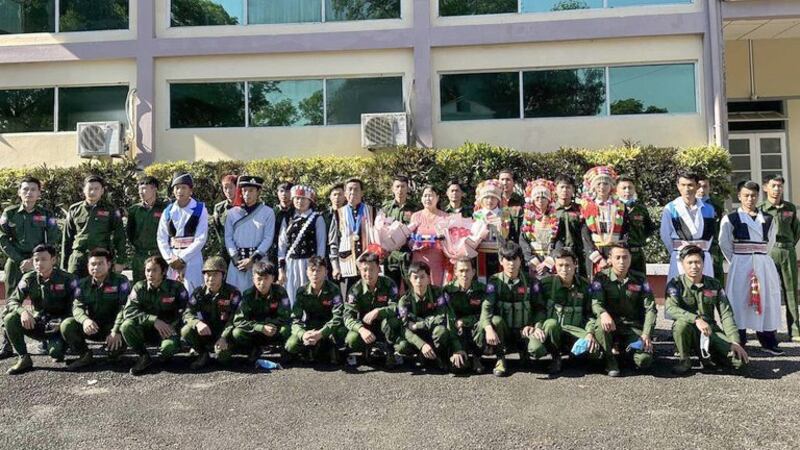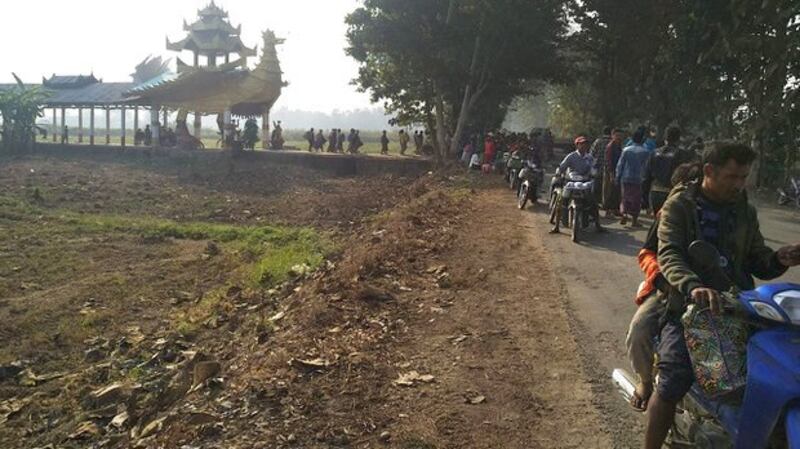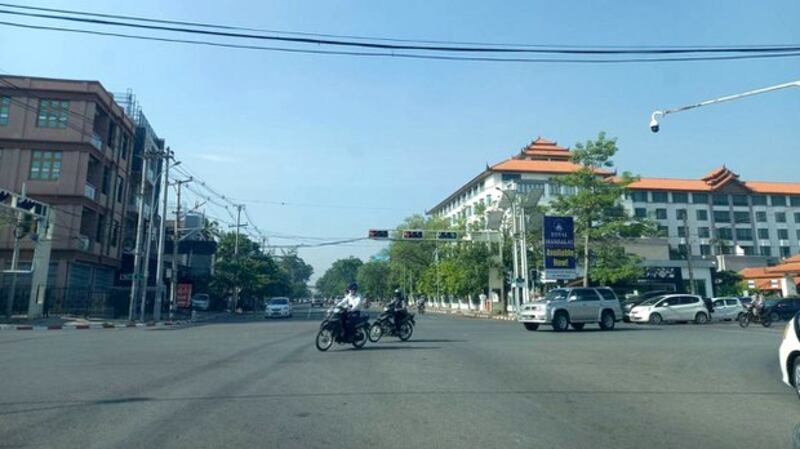Pro-junta militias in northern Myanmar’s Kachin state are grabbing anyone they can find and forcing them to take up arms against resistance fighters after the military regime announced it would begin enforcing a conscription law over the weekend, residents said.
Junta leader Senior Gen. Min Aung Hlaing announced on Feb. 10 that the People’s Military Service Law, enacted in 2010 by a previous military regime though it had never been enforced, would go into effect immediately.
The move comes as anti-junta forces and ethnic armies have scored significant victories against the military in Myanmar’s three-year civil war. The conflict appeared to reach a turning point in late October when the groups jointly launched offensives that overran dozens of military camps and resulted in hundreds of soldiers surrendering.
In Kachin state, the Lisu militia in Waingmaw township, the Khaunglanhpu militia in Puta-O township, and the Shanni Nationalities Army, or SNA, in Mohnyin township, began forcibly recruiting civilians as early as the end of last month, and have been emboldened by the new directive, sources in the region told RFA Burmese.
SNA fighters have been rounding up pedestrians and gathering people through village administrators for recruitment, said a resident of Nam Mun village in Mohnyin’s Indawgyi sub-township who, like others interviewed for this report, spoke on condition of anonymity due to security concerns.
“The administrators are being told to grab passers-by,” he said. “Everyone who is seen on the roads is apprehended.”
People have fled the area and “dare not live in Nam Mun village anymore,” he said.
Another resident reported similar actions in Mohnyin’s towns of Hopin and Nam Mar, adding that those who refused to join the militia were being made to pay hundreds of thousands of kyats (100,000 kyats = US$48).
“After stopping all passers-by, they recruited the people they wanted,” he said. “Among those who were released, some said that they had to pay about 1 million kyats (US$477). They said they were asking for 30 million kyats (US$14,000) [altogether].”
Using family members as leverage
In Puta-O, the Khaunglanhpu militia led by Tang Gu Tan has been forcibly recruiting members of every household to serve for around two weeks, a resident told RFA.
“[But now], the militia is recruiting [people] more than ever,” he said. “Now, whenever they enter villages, they gather young people to join the militia.”

So far, the resident said, Khaunglanhpu fighters are mostly targeting civilians who had previously attended militia training.
The recruitment drive comes after junta troops and militias retreated from Puta-O’s Hkar Gar village in December and the anti-junta ethnic Kachin Independence Army, or KIA, seized the Kha Ran Hti Dam pro-junta militia camp in Khaunglanhpu township the following month.
In Waingmaw township, the Lisu militia, led by Shwe Min, is also recruiting soldiers, said a resident.
“When they carry out recruitment drives, they round up ethnic Lisu people at [three] checkpoints” in the township, he said.
The militia has also been detaining female and elderly family members to force the return of men of fighting age who have fled the drives, he added.
RFA calls to SNA spokesman Col. Sai Aung Mein, Lisu militia leader Shwe Min, and junta spokesperson for Kachin state Thant Zin Ko Ko seeking comment on the forced recruitment drives went unanswered Tuesday.
Win Naing, a lawmaker from nearby Mogaung township, told RFA that forced recruitment is a tactic used by pro-junta groups to undermine public opposition.
“The militias will recruit our people whether they want to join their groups or not, and they will train them whether they are willing or not. Then, they will arm them,” he said. “Ultimately, it’s part of a plan to force the people to fight one another.”
In Bago, too
To the south, a junta recruitment drive that kicked off in Bago region’s Htantabin township on Feb. 12 has led to the conscription of nearly all of the youths in the town of Za Yat Gyi, residents told RFA on Tuesday.
Most of Za Yat Gyi’s residents had already fled fighting that broke out between the military and anti-junta forces on Jan. 7, they said, but junta troops stationed at the town’s hospital have now rounded up those who remained from their homes and nearby villages.
They have also drafted youths displaced by the earlier fighting, residents said, adding that the number of detainees and other information about the recruitment drive is still unknown.

Men and women over the age of 18 have fled to avoid conscription, an elderly resident said.
“Everyone from the town is on the run,” she said, adding that she and her family members are in hiding. “The army enters the villages and arrests people … They arrest girls aged 18 or 19 years. Men of that age are also apprehended and brought to be forced to serve in the military.”
Residents said the villages surrounding Za Yat Gyi are “nearly empty” because people are trying to avoid being drafted into military service.
RFA has been unable to independently verify the claims of forced recruitment in Za Yat Gyi.
Tin Oo, the junta’s spokesperson and minister of economic affairs for Bago region, dismissed reports of civilian recruitment, saying that the military has only targeted people with ties to the People’s Defense Force, or PDF, of ordinary citizens who have taken up arms against the junta’s military forces.
“There have been arrests of members of organizations related to the PDF and that support terrorism, in accordance with the law,” he said. “We have no authorization to arrest innocent citizens.”
Tin Oo added that there have been “no mass arrests,” and “only three or four people were arrested for interrogation.”
Four youths missing
The threat of forced recruitment is increasingly real for youth in Myanmar’s urban areas, as well.
On Tuesday, junta troops arrested four young passengers on a commuter bus from Yangon to Mandalay at a checkpoint near Tada-U township, located around 24 kilometers (15 miles) southwest of downtown Mandalay, sources close to the detainees told RFA.

The whereabouts of the young men are unknown and they are believed to have been conscripted, the sources said.
Those detained were Zaw Zaw Aung, 23, Kaung Htet Soe, 24, Thwin Soe Tun, 23, and Tin Htut Win, 24, they said.
“They were returning from Yangon after taking a test to go [work in] Korea,” one of the sources said. “They were arrested at a toll gate before reaching Tada-U.”
RFA calls to Thein Htay, the junta’s spokesman and economic minister for Mandalay region, seeking comment on the apprehension of the four youths went unanswered Tuesday.
According to Myanmar’s compulsory military service law, men aged 18-35 and women aged 18-27 face up to five years in prison if they refuse to serve for two years.
Professionals – such as doctors, engineers and technicians – aged 18-45 for men and 18-35 for women must also serve, but up to five years, given the country’s current state of emergency, extended by the junta on Feb. 1 for another six months.
Burmese of fighting age have told RFA they would team up with resistance fighters or leave Myanmar rather than serve as soldiers for the junta, which seized power in a coup d'état three years ago.
Translated by Htin Aung Kyaw. Edited by Joshua Lipes and Malcolm Foster.
